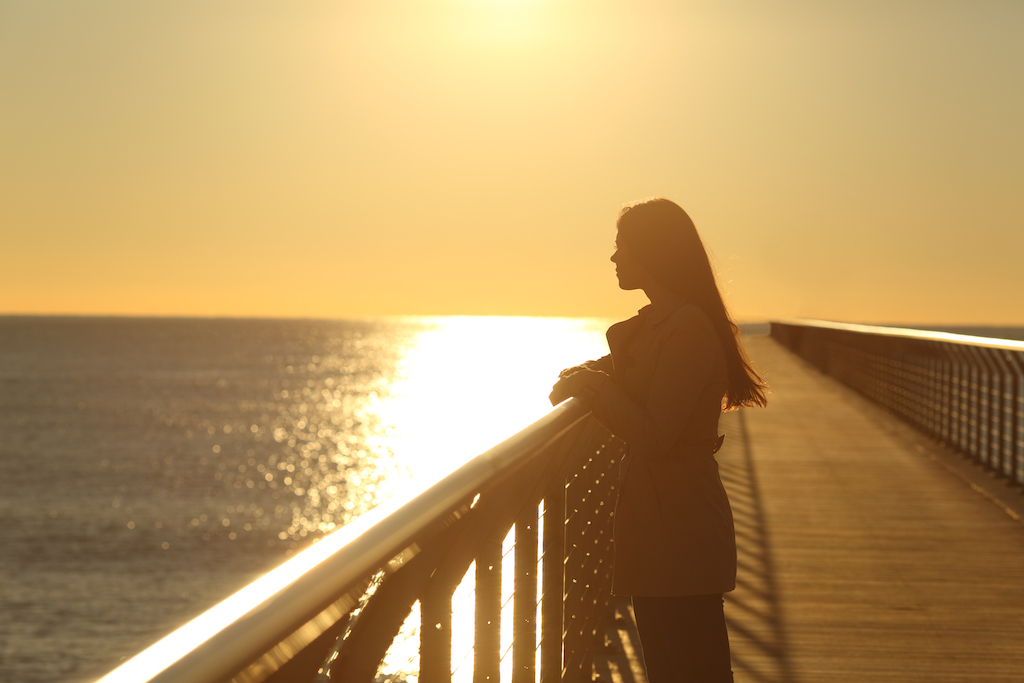Does the prospect of spending time alone fill you with dread, or do you secretly dream of running off to a deserted island? I often find myself plotting a solo escape, although you might never guess that.
Friends have described me as friendly, outspoken, gregarious, and highly social. I would describe myself as a loner, someone who needs and craves time to myself. Both depictions would be accurate, which might seem anomalous, but it turns out there is a pigeonhole for this. As personalities go, I am what some psychology sources define as an “ambivert,” or an outgoing introvert.
Even as a child, I exhibited these seemingly opposite traits. At school, I was the girl on the front row raising her hand to answer or ask a question—popular among teachers and my classmates, and a strong leader among my peers. But when I came home, I couldn’t wait to play dolls, color, or read in my room or go outside and climb a tree, make mud pies, or fish for tadpoles in the creek … all by myself.
Then I grew up and got “busy.” Like most adults, I was handed a free ticket to the Tilt-A-Whirl of life, constantly going and doing, often spinning out of control and screaming to get off the ride. But there was always the next task or chore or goal and the next social expectation—no slowing down to consider the most judicious use of my time and energy or what might be most gratifying. Life was a series of actions on autopilot—lots of yeses and rarely a no.
In 2012, I got stopped in my tracks when a surgery took my feet out from under me for several months. Suddenly, there was no place to go and nothing to do (in hindsight, perfect preparation for a pandemic). It was during that time that I began seeing the value of both solitude and stillness—not only to heal the physical body but to soothe the soul—to explore the vast terrain of heart, mind, and spirit. I can say with certainty that being comfortable in my own company has been a lifeline during the lockdowns and forced isolation of recent years.
Alone, not lonely
Solitude, to be clear, is not synonymous with loneliness. No matter how introverted or extroverted a person may be, we all need connection with others.
“Humans are inherently social creatures, and we need others to maintain our emotional well-being,” said Stanford Healthcare psychologist Sarah Adler. “But interestingly, spending time alone is just as important for us to connect more deeply with ourselves. Being alone is actually just a state; it means that you are not with other people. Loneliness is an emotion, which describes a feeling of sadness attributed to not having connection.”
Notable is the fact that loneliness can creep in whether we are alone or not. Have you ever felt “alone” at a party or in a crowd? When you feel like people aren’t really seeing or understanding you, it doesn’t matter how many bodies surround you or how many followers you have on Instagram, you’re likely to feel lonely.
Benefits of solitude
Multiple studies tout the benefits of solitude, and it is important not to see the word “alone” as a negative. Ester Buchholz, a psychologist and the author of The Call of Solitude: Alonetime in a World of Attachment (Simon and Schuster, 1997), a book she called her “biography of need,” Buchholz urged readers to spend more time on their own and asserted that alone time is a developmental and biological need for both children and adults. “Both needs—to be alone and to engage—are essential to human happiness and survival,” Buchholz wrote. “Alonetime is a great protector of the self and the human spirit.”
Russian novelist Fyodor Dostoevsky also wrote about the value of spending time alone. “In solitude we can forge our character away from the often-constricted external demands of others and maintain our independence in the relationships we cultivate thus ensuring we do not, like many today, lose our identity in them.”
If you’re not used to spending time alone, solitude can be uncomfortable, awkward, even scary. But if we allow anxiety to keep us from carving out meaningful time for ourselves, we will miss out on the joys of self-discovery and the power of inner calm. Ultimately, it’s about getting to know who you are and being at peace with yourself.
Add stillness
But is being alone enough? Stillness is not a direct outtake of solitude. One can be alone and remain in a state of inner turmoil and overwhelm. It’s where solitude and stillness meet that the most profound insights occur and the greatest personal growth can take place.
Always being on the go and not taking time for stillness is a toxic way to live. Stillness draws you into the present moment, makes thoughts and ideas clearer, and provides a window to all that truly matters.
Being still can also lead to better health. Demands of work and life can introduce stressors into your life which can lead to heart problems, high blood pressure, weight loss or gain, emotional instability, and more. Taking a few precious minutes out of your day to be still can act as a reset button, an opportunity to refresh your way of thinking, being, and doing.
Find time
Time is the X-factor that often prevents us from engaging in much-needed solitude or coveted “me” time. There is no such thing as finding more of it. What it boils down to is making time count.
When I mention stillness to friends, I mostly get blank stares and comments such as, “I’m too busy”; “I need to be productive”; I don’t have time to be still”; or “I can’t be still.” I get it. The idea of being still is counter-cultural to our fast-paced, on-the-go society where multitasking is the norm and busyness a badge of honor. You have jobs, families, responsibilities, appointments, and even hobbies demanding segments of your day until it seems impossible to wring out a single moment of quiet contemplation.
But here’s the deal. If you are running yourself ragged without a minute to breathe, chances are you are not functioning at your highest level. When we allow the everyday frenzy of our outer life to keep us from fully exploring our inner life, we cheat the world, our loved ones, and ourselves of our best. We may get a lot done, but at what price? What if five minutes of stillness allowed you to be a more pleasant version of yourself? That investment would pay dividends in every area, would it not?
If you are the go-to person, the one with the reputation for getting it all done, you may struggle initially to claim time to yourself. Perhaps you need a lot of structure in your day. Busy people usually do. So, schedule your alone time; put it on your calendar. Make a daily appointment with yourself, whether it is 10 minutes or half an hour. You can plan to do something or do nothing, but get in the habit of honoring the commitment as you would any other. Just take care not to make alone time another chore to check off your endless to-do list. Use it for something that benefits you physically and/or mentally: take a nap; listen to music; go for a walk; soak in the bathtub; or sit outside and enjoy nature. Avoid activities such as television or social media that simply distract your mind rather than free you to think and feel.
Combining solitude and stillness is not a recipe for the life of a recluse. You may find that a little healthy alone time coupled with a few moments to simply “be” builds confidence, increases productivity, invigorates your social life, and makes you a better person all around.



